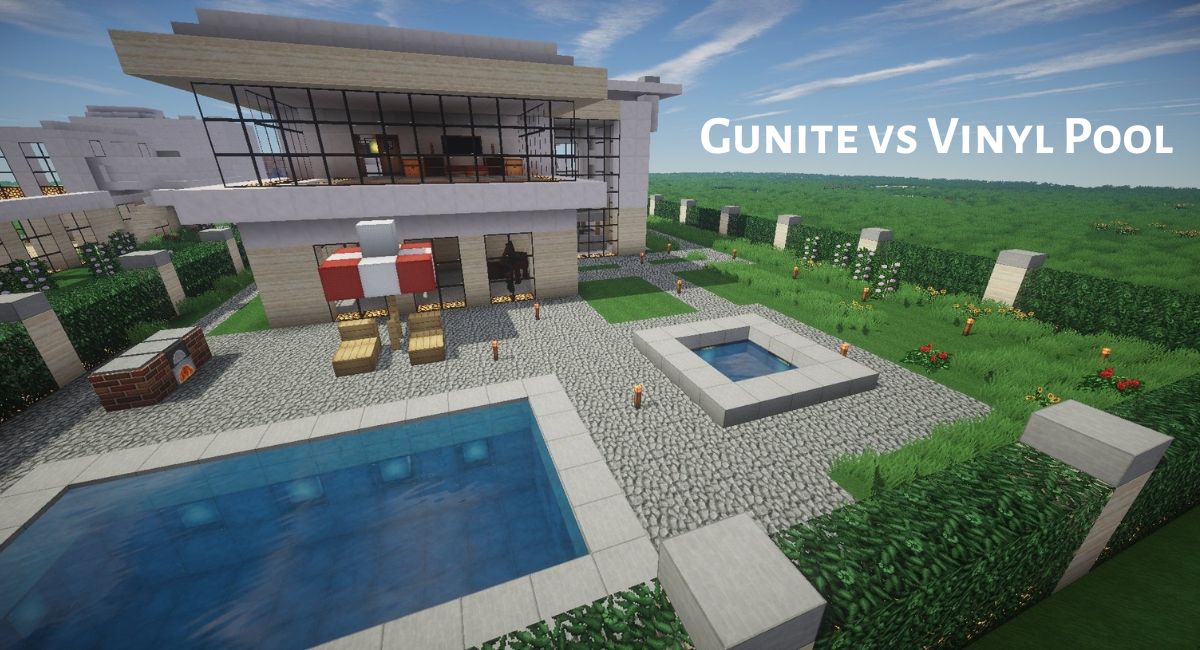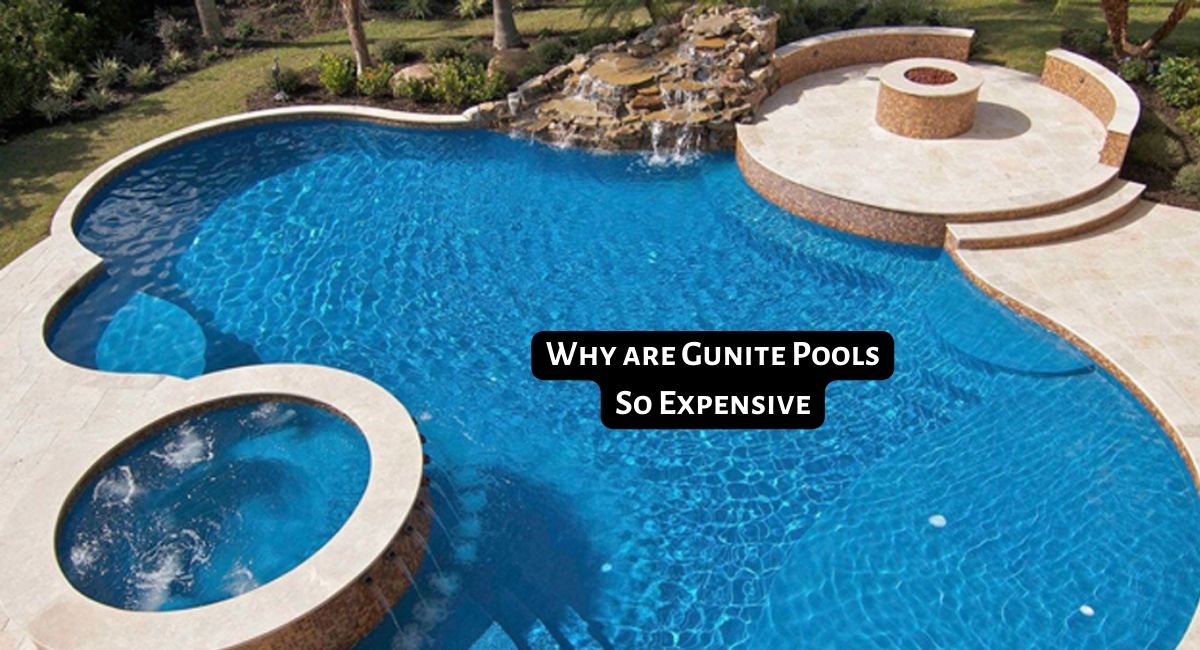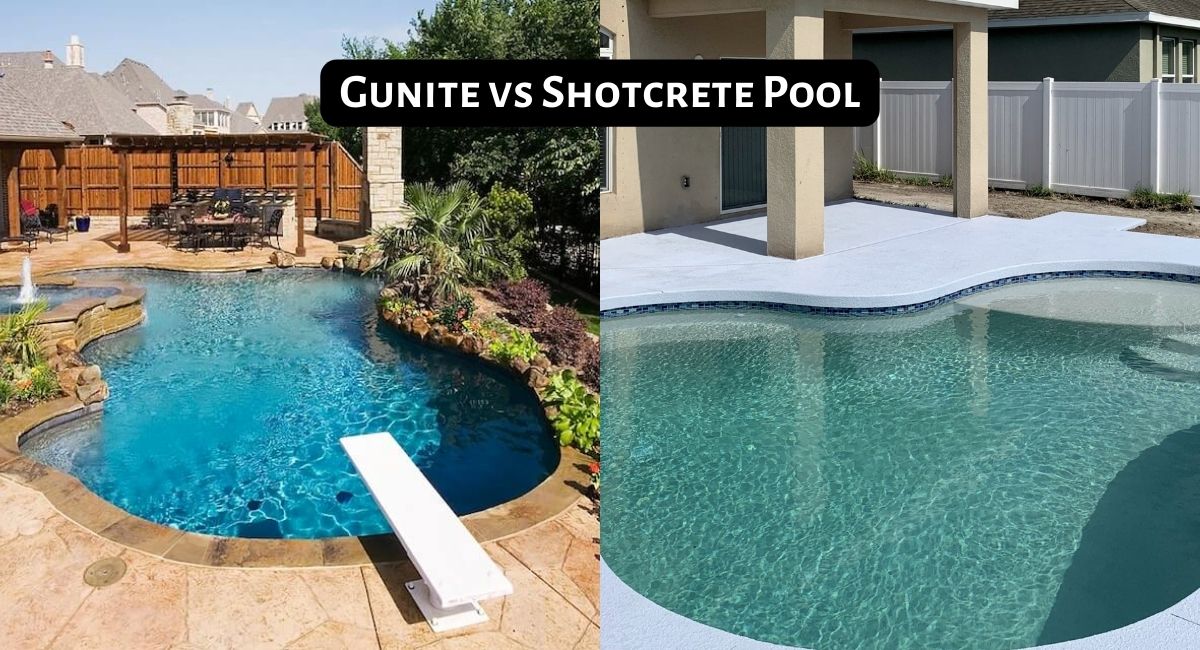Choosing between gunite vs vinyl pool is not an easy decision. Making sure you know all there is to know is the best place to start. When looking to purchase a new pool, many homeowners are faced with the decision of Gunite and Vinyl. Gunite is a mixture of sand and cement that is sprayed onto steel rods to create an incredibly strong pool shell.
On the other hand, Vinyl pools are preformed liners made from high-grade PVC material that fit into an excavated hole and are held in place by a metal or polymer support structure. Gunite pools tend to be more expensive than Vinyl pools, but they also come with many advantages that may make them worth the extra cost.
Table of Contents
Gunite vs Vinyl Pool – Which is the Best In-Ground Pool?
Gunite and vinyl pools are two of the most popular materials used for constructing in-ground swimming pools. Gunite is a type of concrete mix that is shot onto the pool walls at high pressure and then smoothed to create a durable, long-lasting shell. Vinyl pools use large pre-formed panels that are fitted together to form the pool walls. Gunite is the more expensive of the two materials, but it also offers greater durability and strength compared to vinyl pools.
Gunite pools are more flexible in design since they can be custom-shaped and formed, while vinyl pools require a pre-determined shape. Gunite pools take longer to install due to their complex installation process, whereas vinyl pools can be installed quicker.
Gunite requires more maintenance and repairs than vinyl, but it is also easier to repair if damaged. Vinyl pools require minimal maintenance and repairs, but their pre-formed shape limits the design options available.
How to Choose Between Gunite and Vinyl Pools?
Both Gunite and vinyl pools offer advantages depending on your needs and budget. Consider each option carefully before making a final decision.
What are Gunite Pools?
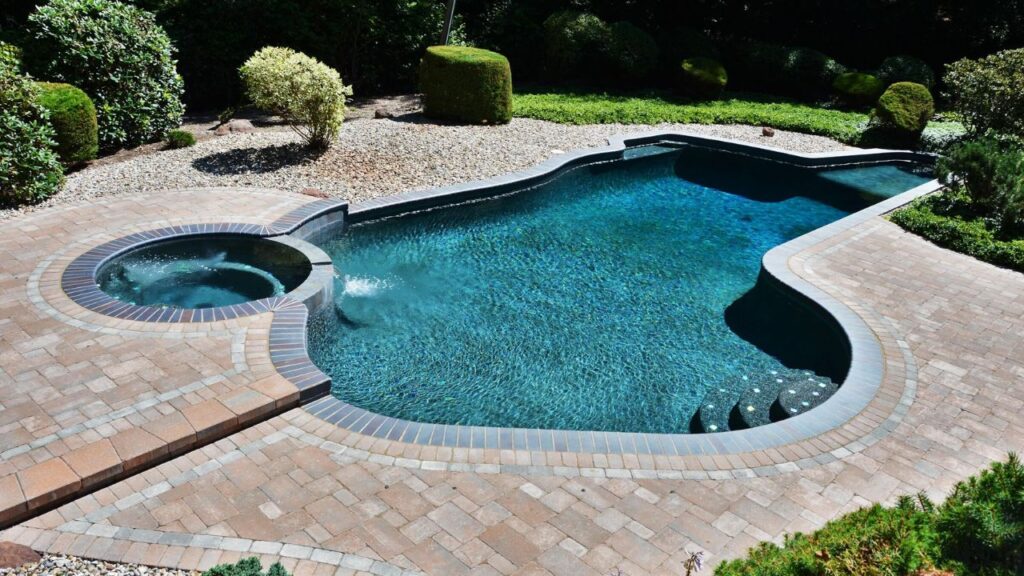
Gunite pools are made from a mixture of concrete, sand, and water that is sprayed onto steel-reinforced walls. Gunite pools are strong and durable, which makes them ideal for areas with extreme weather conditions. Gunite pool owners can customize their gunite pool’s shape, size, depth and other features to create the perfect pool for their backyard.
Gunite pools are also more resistant to wear and tear than vinyl pools, making them a great long-term investment for homeowners. Gunite pools require regular maintenance in order to stay in good condition, however, the benefits of having a gunite pool often outweighs the hassle of upkeep. Gunite pools offer exceptional longevity,
Advantages and Disadvantages of Gunite Pools
| ADVANTAGES | DISADVANTAGES |
| Durable: Gunite pools are extremely durable and can last for decades with proper care and maintenance. | Installation process: Gunite is sprayed on site, so the installation process can be messy and time consuming. |
| Customizable: Because gunite is sprayed on site, it offers a wide range of customization options including shape, size, depth and more. | Potential for leaks: Gunite pools can develop cracks and leaks over time, which can be costly to repair. |
| Longer Lifespan – Gunite pools require very little maintenance and have a longer lifespan than other pool types. With proper care, your gunite pool can last for decades. | Algae growth: Gunite pools are more prone to algae growth as the surface is not smooth like that of a vinyl liner or fiberglass pool. Regular maintenance is required to keep these pools clean. |
What are Vinyl Pools?
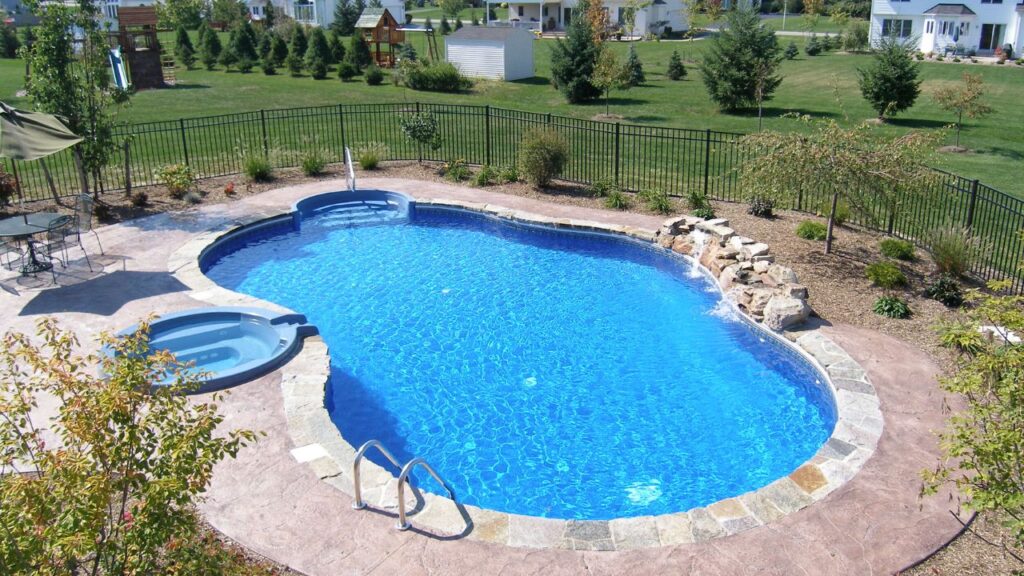
Vinyl Pools are one of the most popular type of swimming pools on the market. Vinyl pools come in a wide variety of shapes and sizes to fit any backyard setting, and they are generally less expensive than concrete or fiberglass pools. They are made from vinyl liners that can be custom-fitted to any desired shape and size.
Vinyl pools offer a cost-effective alternative to in-ground concrete or fiberglass swimming pools and can be installed relatively quickly. Vinyl Pools are also known for their durability, with liners lasting up to 25 years. Additionally, vinyl is easy to maintain as it does not corrode or fade over time like other pool surfaces.
Advantages and Disadvantages of Vinyl Pools
| ADVANTAGES | DISADVANTAGES |
| Cost – Vinyl pools are less expensive than most other types of in-ground pools. This makes them a great choice for people who want a pool but don’t have the budget for more expensive options like concrete or fiberglass. | Repairs – It can be difficult to repair vinyl pools since it is difficult to match the color and texture of new material with the existing pool. |
| Durability – Vinyl is a durable material that is capable of lasting for decades with proper care and maintenance. | Maintenance – Vinyl pools require more maintenance than other types of in-ground pools, as they must be kept clean and free from debris. |
| Installation – Vinyl pools are relatively easy to install and can be done in as little as a few days depending on the size and complexity of the pool. | Temperature – Vinyl can become brittle when exposed to extreme temperatures, making it less durable than other types of in-ground pools. |
Comparing Gunite and Vinyl Pools – Differences and Choosing the Right One
| Gunite Pools | Vinyl Pools |
| Gunite pools are built with a special mixture of sand, cement, and water. The mixture is sprayed onto the pre-built structure and then allowed to harden. Gunite pools take longer to build than vinyl pools due to the time required for the gunite material to cure properly. | Vinyl liner pools use flexible plastic liners to form the structure of the pool. Vinyl liner pools require less time and money to install, as the liners can be stretched over a pre-built shape of your choice. |
| Gunite pools also require more specialized installation equipment and have a higher degree of difficulty when building. Gunite pools have a smooth and durable surface, which is ideal for kids and elderly people because it is less slippery than vinyl. | Vinyl is also the most affordable pool option that you can find. However, vinyl pools are slippery and lack durability compared to Gunite pools, so they may need more frequent maintenance or repairs over time. |
| Gunite pools are more expensive to install than vinyl due to the cost of materials and labor, but they require minimal maintenance once they’re installed. Gunite pools are also the most customizable pool option and can be built to any size or shape desired. | Vinyl pools are also quite expensive, but much cheaper to install than gunite pools. |
| Gunite pools have a more attractive aesthetic than vinyl pools, as they come in a variety of colors and designs that can enhance any backyard oasis. | While Gunite pools have great customizability, Vinyl liner pools are limited in terms of design options. Vinyl pools also lack the attractive aesthetic of Gunite pools and can often appear dull or outdated compared to Gunite’s modern look. |
At the end of the day, it’s up to you to decide which type of pool is best for your backyard needs. Gunite pools are more expensive to install, but they require minimal maintenance and have a smooth surface that is perfect for kids and the elderly. Vinyl liner pools offer an affordable option with quick installation, but lack the customizability and durability of Gunite pools.
Depending on your budget, aesthetic preference, maintenance needs, and design requirements, Gunite or Vinyl could be the perfect pool for you. Research your options thoroughly and make sure to consult with a professional before making any decisions. Good luck!
Conclusion
In conclusion, Gunite and Vinyl pools both have their pros and cons. Gunite is the most durable choice of pool construction on the market, with a lifespan that far exceeds that of a vinyl pool. Gunite construction is also more resistant to damage from weather, pests and other sources. However, it does require more maintenance than vinyl because of its porous nature. Vinyl pools have the advantage of being less expensive to install and more resistant to algae growth and other contamination, but they do not last as long as Gunite pools.
Ultimately, choosing between Gunite vs Vinyl pool depends on factors such as budget, maintenance needs and desired lifespan. Both are excellent choices for swimming pool installation.
Frequently Asked Questions (FAQs)
What is the difference between vinyl pool and gunite?
Vinyl pool and gunite are two of the most popular types of swimming pools. Vinyl pools feature a vinyl liner, while gunite swimming pools consist of concrete sprayed with a layer of sand or pebble finish. Vinyl pools typically cost less than gunite and are easier to install since they require minimal construction. The vinyl liner is durable, resistant to algae and can be repaired if any part of it becomes damaged. However, the limited shape and design options mean there are fewer choices when it comes to customizing a vinyl pool. Gunite pools offer more freedom in terms of customization since they are formed directly into the desired shape with concrete sprayed over steel reinforcement.
Which type of pool is best?
The best type of pool for a particular person or family depends on their needs, preferences, and budget. In-ground pools tend to be more expensive but offer greater customization options such as built-in spas and waterfalls. Above ground pools are more affordable but may require additional steps for winterization and safety features like fencing. It’s also important to consider the maintenance requirements of each type of pool. In-ground pools typically require more regular maintenance due to their larger size and increased complexity, while above ground pools are generally easier to maintain.
What are the cons of a gunite pool?
One of the main disadvantages of a gunite pool is that it can be costlier to install and maintain than other types of pools. The installation process requires specialized equipment, labor, and materials, making it more expensive than some traditional pool designs. Additionally, because gunite pools are typically customized to fit each individual customer’s specifications, the cost can increase significantly. Gunite pools also require more maintenance than other types of pools because they are prone to cracking, even with proper maintenance and upkeep.
What type of pools last the longest?
The type of pool that will last the longest is one made from concrete, also known as a gunite pool. This type of pool is built on-site using special equipment and techniques to create a strong, durable structure that can withstand the elements for decades. Gunite pools are highly customizable in terms of shape and size, which makes them a great choice for any backyard.
What type of pool is cheapest to maintain?
The cheapest type of pool to maintain is an above-ground pool. Above-ground pools don’t require excavation and installation costs, so they are usually more affordable than in-ground pools. They also have fewer maintenance needs and can be easily winterized if necessary. Other factors that determine the cost of maintaining a pool include the size of the pool, the type of equipment used, and the frequency of cleaning.
